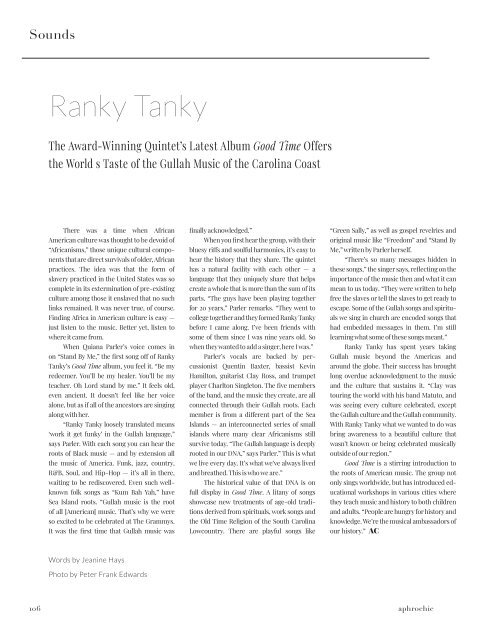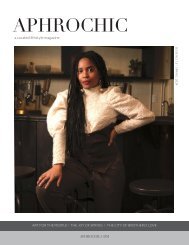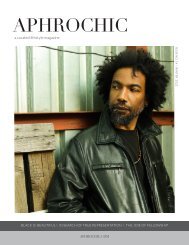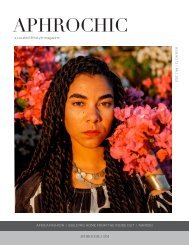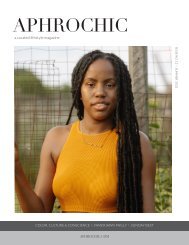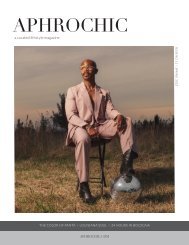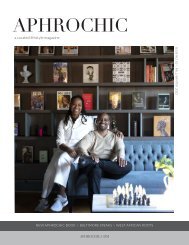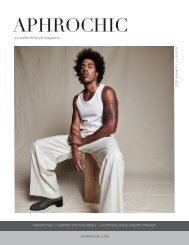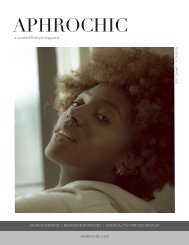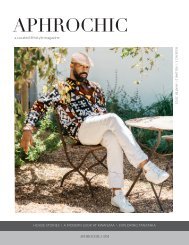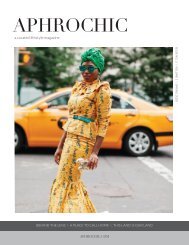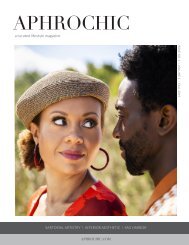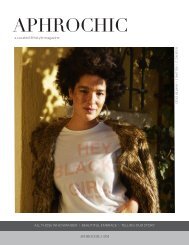AphroChic Magazine: Issue No. 4
In this issue, we sit down with artist, Malik Roberts, who relates the experience of creating one of the few African American artworks to sit permanently in the Vatican collection. Fashion designer, Prajjé Oscar John-Baptiste introduces his latest collection — an ode to Haiti, and its goddesses. We head to South Carolina to experience the Gullah-inspired music of Ranky Tanky. And in New York, we watch a new world being born with photographer and journalist, Naeem Douglass, who takes us inside the city’s Black Lives Matter protests, and economist Janelle Jones, who reminds us in these times that we are the economy. We are thrilled to share our cover with chef and musician, Lazarus Lynch. Inside, we talk with him about his cookbook, Son of a Southern Chef and his new album, I’m Gay. From a house tour in Brooklyn to a travel piece in Tobago, this issue takes you all over the Diaspora. And we see how of the concept of Diaspora was first introduced in a look back at how Pan-Africanism led the way to how we think of international Blackness today. It is a showcase of our culture, our creativity, our resilience, and our diversity, our demands for the present and our hopes for the future. Welcome to our summer issue.
In this issue, we sit down with artist, Malik Roberts, who relates the experience of creating one of the few African American artworks to sit permanently in the Vatican collection. Fashion designer, Prajjé Oscar John-Baptiste introduces his latest collection — an ode to Haiti, and its goddesses. We head to South Carolina to experience the Gullah-inspired music of Ranky Tanky. And in New York, we watch a new world being born with photographer and journalist, Naeem Douglass, who takes us inside the city’s Black Lives Matter protests, and economist Janelle Jones, who reminds us in these times that we are the economy.
We are thrilled to share our cover with chef and musician, Lazarus Lynch. Inside, we talk with him about his cookbook, Son of a Southern Chef and his new album, I’m Gay.
From a house tour in Brooklyn to a travel piece in Tobago, this issue takes you all over the Diaspora. And we see how of the concept of Diaspora was first introduced in a look back at how Pan-Africanism led the way to how we think of international Blackness today. It is a showcase of our culture, our creativity, our resilience, and our diversity, our demands for the present and our hopes for the future. Welcome to our summer issue.
You also want an ePaper? Increase the reach of your titles
YUMPU automatically turns print PDFs into web optimized ePapers that Google loves.
Sounds<br />
Ranky Tanky<br />
The Award-Winning Quintet’s Latest Album Good Time Offers<br />
the World s Taste of the Gullah Music of the Carolina Coast<br />
There was a time when African<br />
American culture was thought to be devoid of<br />
“Africanisms,” those unique cultural components<br />
that are direct survivals of older, African<br />
practices. The idea was that the form of<br />
slavery practiced in the United States was so<br />
complete in its extermination of pre-existing<br />
culture among those it enslaved that no such<br />
links remained. It was never true, of course.<br />
Finding Africa in American culture is easy —<br />
just listen to the music. Better yet, listen to<br />
where it came from.<br />
When Quiana Parler’s voice comes in<br />
on “Stand By Me,” the first song off of Ranky<br />
Tanky’s Good Time album, you feel it. “Be my<br />
redeemer. You’ll be my healer. You’ll be my<br />
teacher. Oh Lord stand by me.” It feels old,<br />
even ancient. It doesn’t feel like her voice<br />
alone, but as if all of the ancestors are singing<br />
along with her.<br />
“Ranky Tanky loosely translated means<br />
‘work it get funky’ in the Gullah language,”<br />
says Parler. With each song you can hear the<br />
roots of Black music — and by extension all<br />
the music of America. Funk, jazz, country,<br />
R&B, Soul, and Hip-Hop — it’s all in there,<br />
waiting to be rediscovered. Even such wellknown<br />
folk songs as “Kum Bah Yah,” have<br />
Sea Island roots. “Gullah music is the root<br />
of all [American] music. That’s why we were<br />
so excited to be celebrated at The Grammys.<br />
It was the first time that Gullah music was<br />
finally acknowledged.”<br />
When you first hear the group, with their<br />
bluesy riffs and soulful harmonies, it’s easy to<br />
hear the history that they share. The quintet<br />
has a natural facility with each other — a<br />
language that they uniquely share that helps<br />
create a whole that is more than the sum of its<br />
parts. “The guys have been playing together<br />
for 20 years,” Parler remarks. “They went to<br />
college together and they formed Ranky Tanky<br />
before I came along. I’ve been friends with<br />
some of them since I was nine years old. So<br />
when they wanted to add a singer, here I was.”<br />
Parler’s vocals are backed by percussionist<br />
Quentin Baxter, bassist Kevin<br />
Hamilton, guitarist Clay Ross, and trumpet<br />
player Charlton Singleton. The five members<br />
of the band, and the music they create, are all<br />
connected through their Gullah roots. Each<br />
member is from a different part of the Sea<br />
Islands — an interconnected series of small<br />
islands where many clear Africanisms still<br />
survive today. “The Gullah language is deeply<br />
rooted in our DNA,” says Parler.” This is what<br />
we live every day. It’s what we’ve always lived<br />
and breathed. This is who we are.”<br />
The historical value of that DNA is on<br />
full display in Good Time. A litany of songs<br />
showcase new treatments of age-old traditions<br />
derived from spirituals, work songs and<br />
the Old Time Religion of the South Carolina<br />
Lowcountry. There are playful songs like<br />
“Green Sally,” as well as gospel revelries and<br />
original music like “Freedom” and “Stand By<br />
Me,” written by Parler herself.<br />
“There’s so many messages hidden in<br />
these songs,” the singer says, reflecting on the<br />
importance of the music then and what it can<br />
mean to us today. “They were written to help<br />
free the slaves or tell the slaves to get ready to<br />
escape. Some of the Gullah songs and spirituals<br />
we sing in church are encoded songs that<br />
had embedded messages in them. I’m still<br />
learning what some of these songs meant.”<br />
Ranky Tanky has spent years taking<br />
Gullah music beyond the Americas and<br />
around the globe. Their success has brought<br />
long overdue acknowledgment to the music<br />
and the culture that sustains it. “Clay was<br />
touring the world with his band Matuto, and<br />
was seeing every culture celebrated, except<br />
the Gullah culture and the Gullah community.<br />
With Ranky Tanky what we wanted to do was<br />
bring awareness to a beautiful culture that<br />
wasn’t known or being celebrated musically<br />
outside of our region.”<br />
Good Time is a stirring introduction to<br />
the roots of American music. The group not<br />
only sings worldwide, but has introduced educational<br />
workshops in various cities where<br />
they teach music and history to both children<br />
and adults. “People are hungry for history and<br />
knowledge. We’re the musical ambassadors of<br />
our history.” AC<br />
Words by Jeanine Hays<br />
Photo by Peter Frank Edwards<br />
106 aphrochic issue four 107


